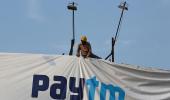The country's economy will start witnessing a growth of 6.5 to 7 per cent from fiscal 2023 onward, helped by various reforms undertaken by the government so far and also as COVID-19 vaccination drive progresses, Chief Economic Advisor Krishnamurthy Subramanian said.

He said the second wave of COVID-19 is unlikely to have a very significant on the economy.
The country's economy contracted by 7.3 per cent in fiscal 2020-21.
“Together with the reforms and focus on vaccination, I expect growth to start hitting close 6.5 to 7 per cent from FY23 onwards and accelerate from there on,” Subramanian said at a virtual event organised by Dun & Bradstreet.
“Given the significant reforms that have been done over the last one and a half years, I have no hesitation in saying that I look forward to a decade of high growth for India.”
He said the momentum in recovery that was seen in the fourth quarter of FY21 and overall in the second half of FY21 got impacted to some extent by the second wave of COVID-19.
While the second wave was quite devastating on the health side, the economic impact of that has been limited because the second way was much shorter in duration compared to the first wave and the economic restrictions that were placed were primarily at the state level, he said.
“We expect the impact of the second wave to be not very large,” he said.
Subramanian said the supply-side reforms undertaken by the government in sectors such as agriculture, labour, export PLI scheme, change in MSME definition, creation of the bad bank, privatisation of public sector banks among others, are going to push growth in the future.
He said vaccination is important for the country to recover from the pandemic and to convert COVID-19 into effectively the common flu and reduce its impact significantly.
While addressing the event earlier, Economic Advisory Council to the Prime Minister (EAC-PM) Chairman Bibek Debroy said GDP growth rate is a function of what the base was in the last year.
“Since the base in 2021 dropped by 7 and some decimal point percentages, correspondingly the (real rate of) growth in 2021-22, because of that low base, will be high,” he said.
He expects a real rate of growth of around 10 per cent during the current financial year.
Debroy said the pandemic has resulted in whittling away of two years of economic development.
“So it is not only the target of USD 5 trillion dollar (economy by 2024-25) moves far away, but also the fact that adhering to the 2030 SDGs (sustainable development goals) target for India will be a little more difficult.
According to him the indicators that have surfaced so far show that the corporate profitability results are pretty good.
He said that despite good corporate profitability, employment in urban areas has not picked up.
“One of the worrying signs at the moment is, although I said the corporate sector seems to be doing well, there aren't any robust signs of employment picking up in the urban areas, so far.
"This is really a function of what has been happening to un-incorporated enterprises and I have in mind MSMEs,” Debroy added.











 © 2025
© 2025